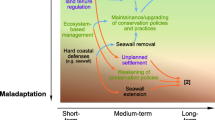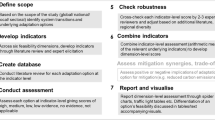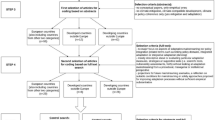Abstract
The Joint Programming Initiative “Connecting Climate Knowledge for Europe” (JPI Climate) is a pan-European intergovernmental initiative gathering European countries to jointly coordinate climate research and fund new transnational research initiatives that provide useful climate knowledge and services for post-COP21 Climate Action. The main objective of JPI Climate is to bring together existing and developing new excellent scientific knowledge that is needed to assist practitioners to adequately transform society towards climate resilience and consequently providing integrated climate knowledge and decision support services for societal innovation. To date, JPI Climate has mobilised more than 100 million EUR in research investments and has provided access to knowledge and expertise across Europe and beyond. Some of the key projects from JPI Climate include “European Research Area for Climate Services” (ERA4CS), designed to boost the development of efficient climate services, “Assessment of Cross(X)-sectoral climate Impacts and pathways for Sustainable transformation” (AXIS), which aims to promote cross-boundary, cross-community research with the overall goal to improve coherence, integration and robustness of climate impact research and connect it to societal needs, and “Enabling Societal Transformation in the Face of Climate Change” (SOLSTICE), bringing together the Social Sciences and Humanities communities to enable and accelerate positive transformation in the face of climate change. The current development of JPI Climate Knowledge Hubs and the potential establishment of a European Facility for Climate Change (EFCC) will further establish JPI Climate as a key player in European climate change research and will actively inform and support the implementation of relevant national, European and international climate strategies and policies.
You have full access to this open access chapter, Download conference paper PDF
Similar content being viewed by others
Keywords
Introduction
The Joint Programming Initiative “Connecting Climate Knowledge for Europe” (JPI Climate) is an initiative of EU Member States and Associated Countries, in cooperation with the European Commission (EC). JPI Climate, comprised of representatives of ministries and organisations for research funding, aims through its programme of activities to connect research, performers and funders across Europe to promote the creation of new knowledge in the natural and anthropogenic climate change domain that is fundamental and relevant for decision support.
The vision of JPI Climate is to actively inform and enable the transition to a low emission, climate resilient economy, society and environment that is aligned with Europe’s long-term climate policy objectives. JPI Climate shall therefore develop and coordinate a pan-European research programming platform to provide useful climate knowledge and services for European and national climate strategies and plans and contributions to the United Nations Framework Convention on Climate Change (UNFCCC) and the United Nations Sustainable Development Goals (SDGs).
JPI Climate’s mission is to align and inform strategies, instruments, resources and actors at national and European levels by connecting the various research communities with research funders and performing organisations, within and across European countries, and beyond Europe.
JPI Climate's vision and mission are framed in its Strategic Research and Innovation Agenda (SRIA) (JPI Climate, 2016), which also sets out three overarching challenges and one strategic mechanism that together are intended to develop and support excellent, innovative, relevant and informative climate research.
Since its establishment, JPI Climate has been at the centre of pan-European investments in climate change research and in harnessing their outcomes to inform effective responses by policymakers and practitioners. Ultimately, these efforts are designed to underpin the European efforts in tackling climate change.
Key Projects
To date, JPI Climate has mobilised more than 100 million EUR in research investments and has provided access to knowledge and expertise across Europe and beyond. This has been possible with the support of its member countries and the EC, and it has been done in partnership with other JPIs (such as FACCE-JPI, JPI Oceans, JPI Urban Europe) and, at the global level, with the Belmont Forum. A list of projects that have been (or are currently being) funded by JPI Climate is available in the JPI Climate e-magazine (JPI Climate, 2019).
In 2013, JPI Climate published its first joint call for transnational collaborative research projects aiming to provide support for top-quality research projects on two topics: Societal Transformation in the Face of Climate Change and Russian Arctic and Boreal Systems.
Projects awarded under the first topic aimed to inform and support societal transformations in the face of climate change and in line with sustainable development in Europe and globally. For the second topic, the awarded projects aimed to improve the fundamental understanding of key biological and physical drivers and feedbacks in the Russian Arctic/Boreal system (tundra-taiga-coastal region) to enable better representation of these processes in climate models.
In 2016, JPI Climate launched “European Research Area for Climate Services” (ERA4CS), its flagship project on climate services (in collaboration with the EC).
The overall objective of ERA4CS is to enhance user adoption of and satisfaction with climate services (including adaptation services). It implies the development of tools, methods and standards to produce reliable information (projections with impact and vulnerability assessments) for various user needs to support smart stakeholder decisions and investment projects, encompassing public, private and community sectors.
At the same time, ERA4CS aims to improve the scientific expertise on climate change risks and adaptation options and to connect that knowledge with decision-making, e.g., by developing and assessing climate adaptation strategies and pathways at different scales (regions, cities, catchments, vulnerable sectors, etc.).
It focuses on the development of a “climate information translation” layer, including climate information production for climate services, as well as researching and advancing climate services as such.
The JPI Climate project “Assessment of Cross(X)-sectoral climate Impacts and pathways for Sustainable transformation” (AXIS) (in collaboration with the EC) aims to promote cross-boundary, cross-community research with the overall goal to improve coherence, integration and robustness of climate impact research and connect it to societal needs. To this effect, AXIS aims to overcome boundaries between science communities through inter- or trans-disciplinary research projects.
AXIS is a successor of ERA4CS. Both are part of the efforts of JPI Climate to contribute to the implementation of the European Roadmap for Climate Services.
The projects funded by JPI Climate range from advancing the understanding of fundamental climate science to enabling the societal transformations that are required in the face of climate change. In this context, the project “Enabling Societal Transformation in the Face of Climate Change” (SOLSTICE), recently launched, aims to bring together the Social Sciences and Humanities communities to enable and accelerate positive transformation in the face of climate change, by engaging with societal actors through innovative approaches.
Ongoing and Future Developments
Since its foundation, JPI Climate has established itself as a key player in the development of pan-European research on climate change through joint funding for research projects of shared interest.
A key objective of all research investments is to ensure a return and valorisation of the outcomes. This has a particular urgency for investments in climate change research and innovation. The returns for investments can include:
-
New knowledge and progress in understanding the causes of climate change;
-
Uptake or use of information and findings in decision-making and policy development;
-
Development and use of solutions by practitioners and stakeholders.
At the global level, the Intergovernmental Panel on Climate Change (IPCC) has provided large scale assessments of progress in understanding climate change and options to address its causes and consequences. These are communicated to policy-makers every 6 to 7 years. Although some countries carry out similar assessments at the national level, there is currently no similar assessment and communication process at the European level, which represents a key operational and strategic gap.
To address this gap, JPI Climate has decided to establish and progress the development of two pilot Knowledge Hubs (KH): one on climate neutrality; and another one on sea level rise.
These will address issues that are central to the science-policy interface and to practical responses in addressing climate change, from local to global scales. Information on these issues is also increasingly and urgently needed to provide effective responses to climate change.
The objectives of the KH on climate neutrality are to provide regular authoritative analysis of the scientific understanding of climate neutrality, to progress on pathways towards achievement of such goal, to provide updates on the potential contribution of technologies and innovative socio-economic and transdisciplinary approaches to advance this process, and to identify knowledge gaps and research needs. The assessments will be global in nature, but focused on Europe and the specific issues and challenges that exist in Europe, including those that arise from its diverse development pathways, geographical and climatic diversity, and societal complexities.
The long-term ambition of the KH on sea level rise is to provide periodic assessments of knowledge on sea level rise drivers, impacts and policy options for each of the major ocean basins around Europe. It will complement existing global and European assessments by providing additional geographical and contextual detail, tailored to regional, national and European policy development and implementation.
These KH will be part of an anticipated future European Facility for Climate Change (EFCC), an innovative organised structure and process supported by governments to provide authoritative knowledge that is designed to address policy and practitioner needs and inform decision-making in an open and dynamic manner. The goal of the EFCC is to support strategic joint flagship projects, clusters of projects or programmes that are able to fill critical knowledge gaps in climate change research or spark developments of networks, knowledge communities or science fields particularly relevant for the implementation of the Paris Agreement and the SDGs.
Conclusions and Recommendations
By aligning the collective investments from European countries in climate change research and innovation and ensuring the uptake of the outcomes in decision-making and policy development, JPI Climate plays a crucial role in informing and supporting the implementation of relevant national, European and international climate strategies and policies.
In this context, JPI Climate is actively engaged in the discussions informing the development and implementation of relevant European climate policy processes, including Horizon Europe and its Missions (Adaptation to climate change, including societal transformation; Climate-neutral and smart cities; Soil health and food), the European Green Deal, the European Climate Law, and the new EU strategy on adaptation to climate change.
JPI Climate is also leading the implementation of the next European Climate Change Adaptation (ECCA 2021) conference, in collaboration with the EC, which will provide a key platform to bring scientists, policy-makers and practitioners together to advance the Mission on adaptation to climate change and showcase JPI Climate's flagship work on climate services. Realising the potential of the ECCA process can be an important step in the development of a KH on solutions and services for climate resilience.
Through its current and future activities, JPI Climate remains committed to provide the knowledge base needed to inform climate policy and decision-making in Europe and beyond.
References
JPI Climate (2016) Strategic Research and Innovation Agenda. Joint Programming Initiative Connecting Climate Knowledge for Europe, Brussels, Belgium. http://www.jpi-climate.eu/gfx_content/documents/JPI%20CLIMATE_SRIA_LR.pdf. Accessed 17 July 2020
JPI Climate (2019) JPI climate e-magazine. http://www.jpi-climate.eu/media/default.aspx/emma/org/10900194/JPI_Climate_e-magazine_17Feb2020.pdf. Accessed 17 July 2020
Author information
Authors and Affiliations
Corresponding author
Editor information
Editors and Affiliations
Rights and permissions
Open Access This chapter is licensed under the terms of the Creative Commons Attribution 4.0 International License (http://creativecommons.org/licenses/by/4.0/), which permits use, sharing, adaptation, distribution and reproduction in any medium or format, as long as you give appropriate credit to the original author(s) and the source, provide a link to the Creative Commons license and indicate if changes were made.
The images or other third party material in this chapter are included in the chapter's Creative Commons license, unless indicated otherwise in a credit line to the material. If material is not included in the chapter's Creative Commons license and your intended use is not permitted by statutory regulation or exceeds the permitted use, you will need to obtain permission directly from the copyright holder.
Copyright information
© 2022 The Author(s)
About this paper
Cite this paper
Fernandes, A.F., McGovern, F. (2022). Adaptation Modelling: A JPI Climate Perspective. In: Kondrup, C., et al. Climate Adaptation Modelling. Springer Climate. Springer, Cham. https://doi.org/10.1007/978-3-030-86211-4_27
Download citation
DOI: https://doi.org/10.1007/978-3-030-86211-4_27
Published:
Publisher Name: Springer, Cham
Print ISBN: 978-3-030-86210-7
Online ISBN: 978-3-030-86211-4
eBook Packages: Earth and Environmental ScienceEarth and Environmental Science (R0)




